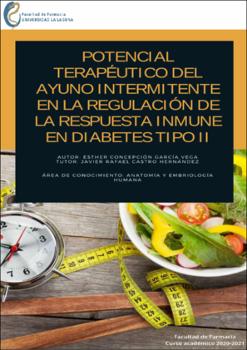Potencial terapéutico del ayuno intermitente en la regulación de la respuesta inmune en diabetes tipo II
Fecha
2021Resumen
La pandemia de sobrepeso y obesidad es una de las mayores preocupaciones a nivel
mundial. Existe una correlación entre peso corporal e inflamación crónica, y es por ello
por lo que cada vez hay más evidencias que apuntan a que la reducción de esta
inflamación puede ser una estrategia para prevenir el desarrollo de enfermedades, o
incluso mejorar la eficacia farmacológica en el tratamiento de otras. En este trabajo hemos
realizado una revisión bibliográfica para investigar la evidencia científica existente entre
el uso de estrategias de ayuno y la mejora del tratamiento de enfermedades asociadas a la
obesidad, como es el caso de la diabetes tipo II; así como su acción sobre la inflamación
crónica asociada a estas enfermedades. Nuestros resultados indican que el ayuno podría
ser una estrategia terapéutica eficaz para controlar las poblaciones de macrófagos
infiltrados en diferentes tejidos y reducir de esta forma la liberación de citoquinas
proinflamatorias. Este efecto antiinflamatorio puede tener un impacto favorable en
pacientes con diabetes mellitus tipo II, aunque la realización del ayuno debe realizarse
siempre bajo supervisión de un especialista. Son necesarios más estudios para entender
los mecanismos que subyacen al ayuno en sus diferentes tipos y poder así adaptar la
variedad de estrategias al paciente, disminuyendo la dosificación farmacológica si así lo
requiriera. Nuestro trabajo pretende servir de base para el planteamiento de
investigaciones futuras que tengan como objetivo la reducción de la inflamación en
enfermedades asociadas al síndrome metabólico y el envejecimiento. The pandemic of overweight and obesity is a major global concern. There is a
correlation between body weight and chronic inflammation, and that is why there is
increasing evidence that the reduction of this inflammation may be a strategy to prevent
the development of diseases, or even improve the pharmacological efficacy in the
treatment of others. In this work we have carried out a literature review to investigate the
existing scientific evidence between the use of fasting strategies and the improvement of
the treatment of diseases associated with obesity, as is the case of type II diabetes; as well as its action on chronic inflammation associated with these diseases. Our results indicate
that fasting could be an effective therapeutic strategy to control macrophage populations
infiltrating different tissues and thus reduce the release of proinflammatory cytokines.
This anti-inflammatory effect may have a favorable impact in patients with type II
diabetes mellitus, although fasting should always be performed under the supervision of
a specialist. Further studies are needed to understand the mechanisms underlying fasting
in its different types and thus be able to adapt the variety of strategies to the patient,
decreasing the pharmacological dosage if required. Our work is intended to serve as a
basis for future research aimed at reducing inflammation in diseases associated with
metabolic syndrome and aging.





